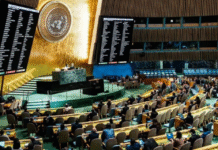
The government on around a dozen occasions has backtracked on its decisions during its two months in office, casting doubts about its resolve.
But according to highly placed sources in the interim government, the main reason behind the backpedalling was a result of pressure created by social media outcry and public perception amid a shifting political landscape.
The government’s U-turns sometimes appeared to be a result of it having to navigate diverse pressure groups and manoeuvre around different preferences of the political forces.
For several weeks after taking oath, Prof Muhammad Yunus faced an almost unrelenting wave of agitation from different quarters who had finally found an empathetic figure at the helm of the government.
Whether it is the appointment of a senior secretary or a deputy commissioner, the constitutional reform commission head or a public prosecutor, the government has backed down from its initial decisions time and again to balance practicality and public desire.
Prof Al Masud Hasanuzzaman, who teaches government and politics at Jahangirnagar University, thinks turning back from its position is nothing but a sign of “indecision”.
“The government had to take many quick decisions because time was of the essence and thus some mistakes were made,” he said.
He told The Daily Star that the government needed capable people to run the administration but had to give in to people’s demands.
Masud said he believed that the government was not acting on the right kind of information all the time.
Speaking about the appointments of DCs last month, a top official close to the council of advisers said the order was made after proper verifications. But the Secretariat witnessed an unprecedented scene and later the government had to cancel the appointments of eight DCs due to protests.
The official said personal secretary to a minister is just another bureaucratic post, but most bureaucrats consider holders of these posts as loyal to the party in power.
This perception caused the interim government to backpedal from its decision to appoint some of these officials.
The missteps in appointments are pretty significant and frequent.
AKM Matiur Rahman was promoted to secretary to the shipping ministry on September 30 only to be made an officer on special duty (OSD) within three days. OSD is considered a punishment post.
Immediately after his appointment, his books on Bangabandhu Sheikh Mujibur Rahman went viral on social media and many raised questions over his appointment that compelled the interim government to change its decision, according to sources.
But according to the top official, this bureaucrat was a brilliant officer.
In another case, the interim government appointed retired officer Ilahi D Khan as the secretary to the food ministry on September 30 on a two-year contract only to cancel the deal within nine hours.
Although the government did not mention any reasons for scrapping the contract, sources said it was because of corruption charges against him by the Anti-Corruption Commission.
Mohammad Khorshed Alam Khastagir, a career diplomat of the 20th BCS batch, was promoted to ambassador for Poland on September 25. But his appointment was cancelled within 10 days reportedly for his role during the uprising.
The interim government replaced head of the Constitutional Reform Commission Shahdeen Malik with Prof Ali Riaz within a week of his appointment.
Economist and public policy expert Masrur Reaz was appointed as the chairman of the Bangladesh Securities and Exchange Commission (BSEC) on August 13, but he regretted his inability to take the job four days later.
Lawyer Ehsanul Haque Samaji was appointed as the new public prosecutor of the Dhaka Metropolitan Sessions Judge’s Court on August 27. A day after his appointment, pro-BNP lawyers staged a protest in front of the Dhaka Bar Association, demanding its cancellation.
The next day, Samaji declined to accept the appointment.
On September 1, BSEC appointed seven independent directors to the board of Dhaka Stock Exchange (DSE). One of them, Majedur Rahman, chairman of Maldives Islami Bank, declined to take the charge.
Last month, filmmaker Ashfaque Nipun was appointed to the censor board. He not only declined but also advocated abolishing the board system altogether.
On September 22, the government abolished the Bangladesh Film Censor Board and announced that it would constitute the “Bangladesh Film Certification Board”.
Daily Star









